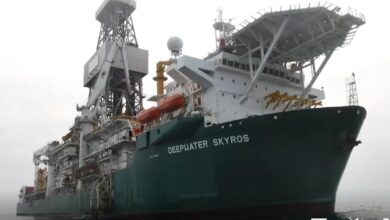As major offshore player, drilling industry must show leadership in corporate ocean responsibility
By Paul Holthus, World Ocean Council
The Sustainable ocean Summit has been postponed to 2010, Dates have yet to be set.
Ocean sustainability issues are increasingly affecting the future of the offshore oil and gas industry and overall ocean health. Leadership from the offshore drilling industry in “corporate ocean responsibility” is essential to navigating this critical juncture and ensuring the long-term health of the industry.
Leadership of the drilling industry addressing sustainability issues is not only important to the future of the industry, but also to the future of the ocean. Responsible industry performers are well positioned to develop and drive business-oriented solutions to marine-environment challenges and collaborate with other ocean industries and stakeholders in ensuring the health of the seas, as well as its continued economic use.
Many policy, practical and public reputation aspects of the offshore oil and gas industry are now affected, if not dominated, by environmental concerns. These issues are affecting all industries that use ocean space and resources, e.g., fisheries, shipping, aquaculture, ports, marine tourism, ocean renewable energy, seabed mining, etc. This is creating important needs and opportunities for collaboration, synergies and business benefits among the ocean business community.
Unfortunately, ocean industries are not engaging in a coordinated, systematic approach to many of the developments affecting their ability to do business in the ocean. They’re missing opportunities for collaboration and economies of scale in developing solutions.
As the principle users of the marine environment, ocean industries – including offshore oil and gas drilling – have the most to gain by developing and delivering sustainability solutions. Of course, they also have the most to lose by continuing to be perceived as the cause of ocean problems.
Access to offshore oil and gas deposits and other ocean resources, services and space is at risk of losing the “social license” to operate in seas and from ocean governance regimes and policies that are emerging from processes in which industry is not well engaged.
To address the ocean sustainability issues and opportunities critical to business, the World Ocean Council (WOC) is creating an unprecedented global, cross-sectoral industry alliance. The WOC is catalyzing proactive, collaborative efforts towards “corporate ocean responsibility” by bringing together the offshore petroleum industry and other sectors. Cross-sectoral leadership and collaboration will result in significant business value for those committed to the vision of a healthy and productive ocean that supports sustainable use.
Growing ocean use
Although the ocean covers over 70% of the Earth’s surface, it is an increasingly crowded place. In addition to offshore oil and gas, other large industries such as shipping, fisheries, aquaculture and tourism have been expanding rapidly, with increasing impact to the marine environment. The expansion of the oil and gas industry into deeper waters and new areas, such as Brazil and West Africa, are well known and substantially changing the composition of the industry.
There has been significant growth in other ocean sectors as well. Seaborne shipping now accounts for 90% of global trade, and worldwide cargo will continue to rise in the coming decades, notwithstanding the current economic downturn. In the seafood sector, human consumption of fish grew from 20 million to 85 million tons during 1960 to 2002, at the same time that the FAO estimates that 70% of fish stocks have become fully or overexploited.
Add in other ocean uses – such as the doubling of cruise ship passenger capacity in the past 20 years, the recent growth in offshore aquaculture, wind farms and wave energy – and the overall mix becomes complex. Inter-industry conflicts in the ocean are on the rise – for example, last year’s skirmishes between fishers and oil firms off the coast of Norway.
As noted by Michael Grey of Lloyd’s List of London: “It is probably sooner rather than later that we will hear of the first accident involving a ship or fishing craft and a wave generator, so systems that promote inter-industry cooperation must surely be welcomed.”
Underlying this growing level and variety of industry activities is an ocean in trouble. Oceans provide 59% of the world’s ecosystem benefits; near-shore marine areas alone (5% of the Earth’s surface) provide 38% of these global benefits. Unfortunately, the global marine environment, its unique biodiversity and its life-sustaining resources are being degraded, destroyed and overexploited at an ever increasing rate and global scale.
Sustainability challenges
Sustainable development of the dynamic, interconnected global ocean “commons” – for which everyone, and no one, is completely responsible – presents unique challenges for industry. As marine environmental health declines, oil and gas and other ocean industries are collectively being held responsible by the public, governments, non-government organizations (NGOs), and intergovernmental organizations (IGOs). Advocacy groups are aggressively confronting ocean industries on a sector, incident or local basis (e.g., oil spills, trawling, port expansion). Moreover, ocean environmental concerns are increasingly being pursed through globally coordinated campaigns (e.g., ocean zoning, marine protected areas, ocean noise, marine debris, greenhouse gas emissions).
Unfortunately, there is often not a corresponding coordination of effort by the fragmented ocean business community to engage these issues.
Ocean stakeholders are pushing for increased regulation in a variety of international venues where international ocean “rules” are established. Although the oil and gas industry has a long-standing and productive interaction with the International Maritime Organization (IMO) regarding oil spills and marine pollution, most ocean sustainability concerns are much broader than this coverage and are being actively taken up in other policy arenas.
Some of the most important ocean governance developments are being pursued through the non-sector-specific international policy processes covering oceans, e.g., the Convention on Biological Diversity (CBD) and the UN Convention on the Law of the Sea (UNCLOS), the Convention on the International Trade in Endangered Species (CITES), etc. Coordinated industry participation in these processes is lacking, as is balanced and comprehensive information regarding industry efforts to address marine environmental issues.
Marine industries are often portrayed only as the cause of ocean problems, with little or no recognition of efforts to develop and implement solutions. This is, in part, because these are usually piecemeal efforts restricted to a single company, or perhaps a sector, and therefore limited in comparison to the broad, multi-sectoral nature of the issues.
The limited efforts by responsible companies to differentiate themselves from poor performers and to try to do business in a more environmentally sustainable way are very important. However, the efforts of one company or even a whole sector are not enough to address collective impact by a diverse range of industries in a shared global ecosystem.
As a result, private-sector access to ocean resources, services and space – even by companies with the best environmental record – is increasingly at risk due to the loss of the “social license” to operate. Ocean governance regimes and policies are emerging from processes in which industry is not well engaged and in which other stakeholders have sophisticated, well-organized agendas and involvement.
Industry leadership, collaboration
As the private sector is the primary ocean user, it is well placed to develop and deliver solutions in response to society’s demands that marine ecosystem use is sustainable and industry impact are minimized. As Vaclav Mikulka, director, United Nations division of ocean affairs and law of the sea, states: “Managing the global oceans requires the involvement of all stakeholders, especially the private sector, and all ocean industries have a responsibility to help maintain the health and productivity of the marine environment.”
The ocean business community can develop this leadership and deliver ocean sustainability solutions that work for business, rather than being forced to react to conditions advanced by other stakeholders. Cross-sectoral ocean business community leadership and collaboration is needed among those who want to address marine environmental issues, differentiate themselves from poor performers, collaborate with like-minded companies within and across sectors, and engage ocean stakeholders and policy processes.
Given the size and scope of the offshore oil and gas-related industries, visionary companies and executives have a particular opportunity to provide leadership in collaborative, industry-driven ocean sustainability.
With the establishment of the World Ocean Council, there is now a structure and process for companies to seize this opportunity and create an international industry leadership alliance on the ocean. As Mr Mikulka says, “The World Ocean Council efforts to bring together the global ‘ocean business community’ to develop leadership and collaboration for ocean sustainability and stewardship are critical to the future of the oceans.”
Solution-oriented strategies, action
The WOC is working to create business value to responsible ocean companies through reduced risk, increased sustainability and solutions through collaboration. This includes reducing risks to ocean industries from uninformed policies by better tracking and participation in these processes and by improving industry relationships with stakeholders.
There are also economic benefits to collaboration amongst industry sectors in developing solutions to shared, pre-competitive issues. Improved communications with the media and public on positive industry actions to address ocean sustainability will generate credibility, visibility and improve reputation. The opportunity to interact with colleagues from other ocean industries will improve relationships among ocean sectors and reduce inter-industry conflicts.
The WOC is the only international organization created to catalyze cross-sectoral industry efforts on ocean sustainability. Through the following strategies and actions, the WOC is working with the responsible ocean business community to address the challenges of ocean sustainability:
1. Creating a vibrant international, cross-sectoral ocean business community that provides private-sector leadership towards achieving marine ecosystem sustainability and addresses threats to ocean space and resource access.
2. Ensuring companies are well-informed on ocean policy and decision-making processes and constructively engaged on key issues and developments with ocean stakeholders.
3. Catalyzing and coordinating cross-sectoral industry collaboration in developing practical, cost-effective, science-based solutions to specific marine environmental issues.
4. Working with ocean industries to improve environmental performance by developing and implementing continuous improvement, best practices and standards.
5. Developing operational ocean industry leadership alliances in priority regional or national or sub-national sea areas.
6. Facilitating interaction among sectors to improve mutual understanding, create cross-sectoral dialogue and reduce ocean use conflicts.
7. Developing collective industry support for, and participation in, improved ocean science, especially on climate change.
8. Undertaking proactive outreach and communication to the media and public on ocean industry efforts and progress in addressing marine environmental issues.
The WOC is achieving considerable progress in its mission to bring together the multi-sectoral ocean business community to catalyze global leadership and collaboration in ocean sustainability and corporate ocean responsibility. Extensive interaction with companies has leveraged involvement and in-kind support for the alliance and the basis of WOC membership.
Interaction with many of the global ocean industry associations (oil and gas, tankers, fisheries, shipping, aquaculture, etc) has led to their interest in the WOC. Relationship-building with the UN and other international ocean agencies, and with NGOs, have resulted in strong endorsements of the WOC mission and efforts.
The Future
Few people know the ocean better than those who depend on it for their livelihood. Companies dedicated to offshore oil and gas – as well as those involved in fishing, seafood, shipping, aquaculture and other marine industries – can and should be leaders in responsible ocean use and ensuring the ocean is healthy and productive.
The World Ocean Council is helping make this happen through an unprecedented business alliance for individuals, companies and associations who care about the ocean – creating private-sector leadership and collaboration in tackling ocean environmental issues, generating business benefits and reducing the threats to continued responsible ocean use.
As Lloyd’s Register notes, “If we are thinking globally, oceanically and collectively, rather than considering our own narrow industry requirements, the World Ocean Council could be a very good idea. (It) could provide just the sort of cooperative inter-industry vehicle we need.”
Paul Holthus, executive director of the World Ocean Council, will provide the keynote presentation at the 2009 IADC Environmental Conference & Exhibition, 12-13 May, Stavanger, Norway.
Quote:
Sustainable Ocean SummitA major international industry conference, the “Sustainable Ocean Summit” (Belfast, 16-17 June 2009), will be the first cross-sectoral conference on ocean sustainability developed by and for the ocean business community. For more information, go online to www .oceancouncil.org or contact Paul Holthus at paul.holthus@oceancouncil.org.




